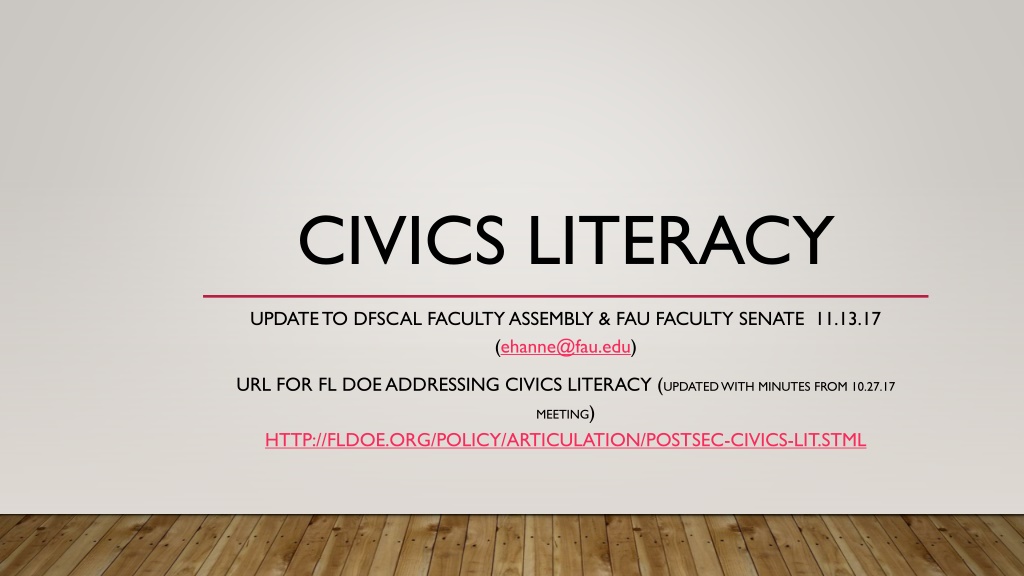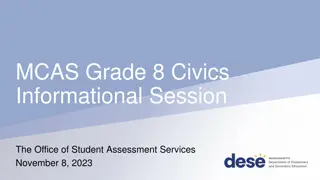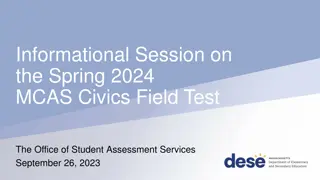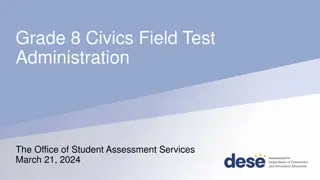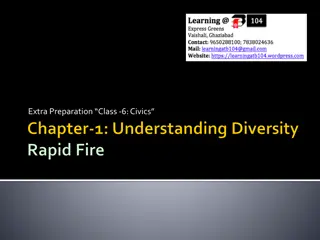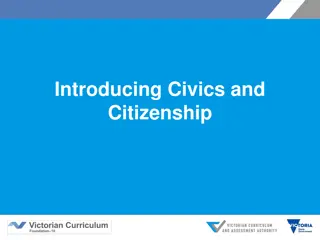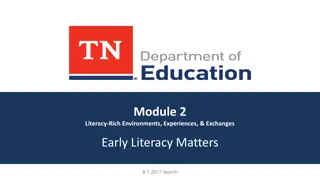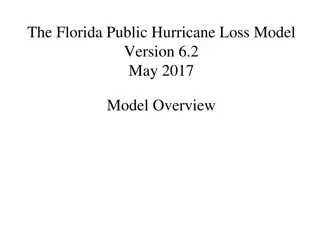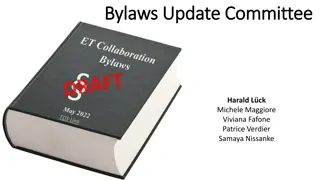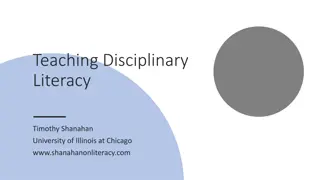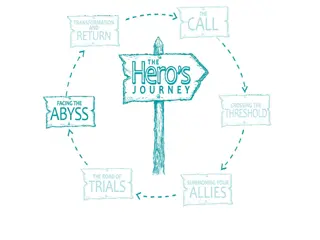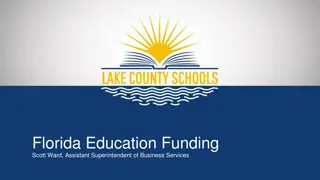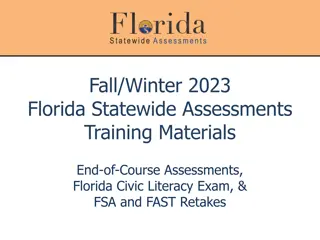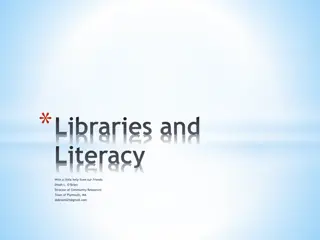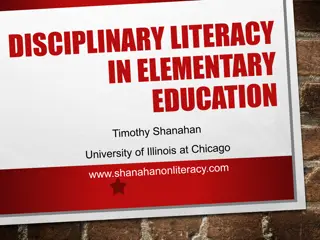Florida Civics Literacy Initiative Update and Committee Members
This update covers the establishment of a new course in civic literacy as per Section 1007.25, F.S., requiring competency in civic literacy for Florida college and university students. The faculty committee members tasked with defining course competencies are listed, including professors from various institutions, steering committee members, and Florida Department of Education staff.
Download Presentation

Please find below an Image/Link to download the presentation.
The content on the website is provided AS IS for your information and personal use only. It may not be sold, licensed, or shared on other websites without obtaining consent from the author. Download presentation by click this link. If you encounter any issues during the download, it is possible that the publisher has removed the file from their server.
E N D
Presentation Transcript
CIVICS LITERACY UPDATE TO DFSCAL FACULTY ASSEMBLY & FAU FACULTY SENATE 11.13.17 (ehanne@fau.edu) URL FOR FL DOE ADDRESSING CIVICS LITERACY (UPDATED WITH MINUTES FROM 10.27.17 MEETING) HTTP://FLDOE.ORG/POLICY/ARTICULATION/POSTSEC-CIVICS-LIT.STML
APPLICABLE STATUTE (SECTION 1007.25, F.S.): Applicable Statute (Section 1007.25, F.S.): (a) Develop a new course in civic literacy or revise an existing general education core course in American History or American Government to include civic literacy. (4) Beginning with students initially entering a Florida College System institution or state university in the 2018- 2019 school year and thereafter, each student must demonstrate competency in civic literacy. Students must have the option to demonstrate competency through successful completion of a civic literacy course or by achieving a passing score on an assessment. The State Board of Education must adopt in rule and the Board of Governors must adopt in regulation at least one existing assessment that measures competencies consistent with the required course competencies outlined in paragraph (b). The chair of the State Board of Education and the chair of the Board of Governors, or their respective designees, shall jointly appoint a faculty committee to: (b) Establish course competencies and identify outcomes that include, at a minimum, an understanding of the basic principles of American democracy and how they are applied in our republican form of government, an understanding of the United States Constitution, knowledge of the founding documents and how they have shaped the nature and functions of our institutions of self-governance, and an understanding of landmark Supreme Court cases and their impact on law and society.
CIVICS LITERACY FACULTY COMMITTEE MEMBERS Common Prerequisite Discipline Committee for Political Science Common Prerequisite Discipline Committee for History Bruno Baltodano, Professor of Political Science; Florida Southwestern State College *Victoria Brower, Assistant Professor, History and Political Science; Broward College Melissa Buehler, Associate Professor; Miami-Dade College Afred Cuzan, Distinguished University Professor of Political Science; University of West Florida Kevin Evans, Assistant Professor, Politics and International Relations; Florida International University Terri Fine, Professor and Associate Director and Senior Fellow of the Lou Frey Institutition of Politics and Government; University of Central Florida *John Hilston, Professor; Eastern Florida State College Christopher Reenock, Associate Professor, Political Science; Florida State University *Steve Tauber, Associate Professor and Chair; University of South Florida Elizabeth Trentanelli, Professor of Political Science; Gulf Coast State College Dawn Dyer, Professor of History; Polk State College Eric Hanne, Associate Professor, Department of History; Florida Atlantic University Steve Noll, Master Lecturer, Department of History; University of Florida *Nicola Foote, Professor of History; Florida Gulf Coast University Gary Paul, Associate Professor, Department of History and Political Science; Florida Agricultural and Mechanical University John Phillips, Professor of History and Education; Gulf Coast State College *David Proctor, Professor of History; Tallahassee Community College David Sheffler, Chair, Department of History; University of North Florida Jason Welch, Department Chair for History, Humanities, Fine Arts, and Foreign Language; North Florida Community College Eric Wolters, Assistant Professor of History; Pasco-Hernando State College *Steering Committee Members FL DOE Staff: Todd Clark (Director, Office of Articulation); Jan Ignash (Vice Chancellor for Academic and Student Affairs, SUS); Karinda Barrett (Associate Vice Chancellor for Academic and Student Affairs, Florida College System)
RESULTS FROM COMMITTEE AS OF 10.27.17 Civic Literacy Recommendations From the Faculty Committee Based on section1007.25, Florida Statutes, the jointly appointed Faculty Committee approved the following recommendations: Course options for students to demonstrate civic literacy 1) AMH X020, INTRODUCTORY SURVEY SINCE 1877, modified to include approved course competencies for civic literacy (FAU AMH 2020) 2) POS X041, AMERICAN GOVERNMENT, modified to include approved course competencies for civic literacy (FAU POS 2041) 3) A new course (course prefix and course number to be determined) that would be available statewide and would not be part of the General Education Core and would include the approved course competencies for civic literacy (Goal to have new course ready for Fall 2019; Working Group from Committee to develop course TBD) Course competencies and outcomes 1) Understanding of the basic principles and practices of American democracy and how they are applied in our republican form of government 2) An understanding of the United States Constitution and its application 3) Knowledge of the founding documents and how they have shaped the nature and functions of our institutions of self governance 4) An understanding of landmark Supreme Court cases, landmark legislation, and landmark executive actions, and their impact on law and society
